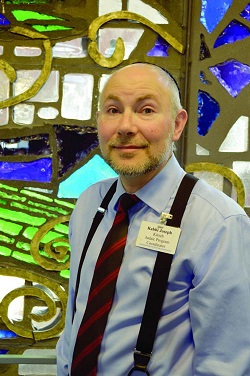10/21/2020
Bringing Peace, Joy, Love, and Endless Healing
- Share This Story
The Role of a Chaplain Explained
by Rabbi Joseph Kirsch

Rabbi Joseph Kirsch is a chaplain for the Jewish Federation of Cleveland, a program supported by the annual Campaign for Jewish Needs, that comforts members of the Jewish community in hospitals, nursing homes, the military, and prisons through correspondence and visits. He is the rabbi at Menorah Park, a Federation beneficiary agency.
Jewish chaplaincy has been a source of support for millenniums. In fact, the surname Kaplan, taken from the word chaplain (or its deviations), is often carried by Kohanim, Jewish priests descended from the high priest Aaron, brother of Moses. The Mishna teaches that Aaron was a spectacular chaplain. Hillel recommends: "Be of the students of Aaron, loving peace, pursuing peace, loving humanity and drawing G-d's creations close to Torah." Thus, the Jewish chaplain arrives peacefully, to be a supportive presence, heal, and make whole.
What does a Chaplain Do?
Jewish Federation of Cleveland chaplains visit all the major local hospitals on a regular basis. We also are available during off-duty hours if an emergency arises. Chaplains wear a hospital ID tag, much as any other hospital worker. Upon arrival, the chaplain receives a current list of the hospital's Jewish patients and begins making rounds. Jewish Federation chaplains carry business cards, get well cards, and even LED Sabbath candles to distribute as needed. Chaplains follow strict privacy laws that pertain to all the medical and personal information of their patients. Upon patient request, chaplains can be a liaison to other rabbis, clergy, or cantors.
Core to a chaplain’s work is prayer. Patients often deeply appreciate a meaningful, personally tailored supplication that a chaplain may compose on their behalf. In certain situations, chaplains may provide end-of-life prayer and the observance of meaningful traditions, as requested by patients or family. Chaplains can educate patients as to various aids available to them, such as the location of a hospital’s Bikur Cholim room. Jewish chaplains also may be called upon to minister to people of other faiths and to do so without imposing or compromising any of their own beliefs.
Changes to Chaplaincy During COVID-19
During the COVID-19 pandemic, chaplaincy is more important than ever. With families of patients having been restricted from hospitals, loved ones on both sides may feel completely isolated. Suddenly, when we need support most, it cannot be there for us.
In order to best protect patients from COVID-19, Jewish Federation of Cleveland’s chaplains are making telephone visits only. Phone chaplaincy provides an added support system, while also protecting patients and staff illness by minimizing their exposure to new individuals. Chaplains are grateful to be another friendly voice and source of community support to the sick.
Having lost some tools in their belts, chaplains across America are coming up with many creative ways to be a supportive presence for their clients. Chaplains have created “reflection rooms” for patients and staff to seek peace and rejuvenate, laminated prayers that can be sanitized, and even “virtual chapels”
Whether in person or by telephone, there is hardly a greater sound on this earth, than the voice of a bedridden hospital patient profusely thanking the chaplain for his/her call. Often choking with emotion, the patient will describe how uplifting the call was to them and how much it will mean to their recovery. There is no end to the limit of joy we can bring the sick through our visitations and prayers. As we have been taught in the Mishna, "these are the things in our world that are limitless ... visiting the sick."
Through your support of Jewish Federation, you get to accompany the Jewish Federation chaplain into each room that he/she enters. There you bring peace, joy, love, and endless healing. Tizku l'mitzvot! May we continue to be worthy of performing good deeds together.


Comments